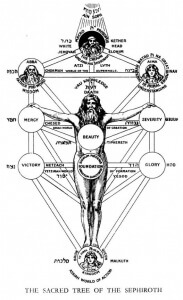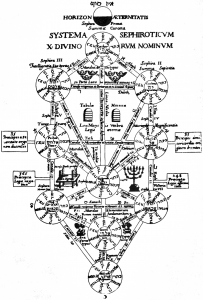When I started in practical magic I was told to treat kabbalah, and the tree of life like a filing cabinet. It was, I was told an effective system of syncretism which allowed similar ideas to be catalogued. The ultimate expression of this was Samuel Mather’s 777 which was pirated by Aleister Crowley.
 Over the years, I have become less enthusiastic with the Tree of Life model which is the basis of the Western approach. I don’t think it productively works and falls to bits too easily if it is changed. Most obviously, there are the planetary attributions which are way off. Placing Saturn in the Supernal triad makes no sense at all and results in some rather daft polarities. Venus does not polarise against Mercury, nor Mars against Jupiter. Jupiter might be expansive but it really polarises against the constrictive Saturn. The position of Geburah (Justice) as being a Martian force is in the wrong place on the pillar of form which is a passive matter orientated pillar in opposition to the pillar of force.
Over the years, I have become less enthusiastic with the Tree of Life model which is the basis of the Western approach. I don’t think it productively works and falls to bits too easily if it is changed. Most obviously, there are the planetary attributions which are way off. Placing Saturn in the Supernal triad makes no sense at all and results in some rather daft polarities. Venus does not polarise against Mercury, nor Mars against Jupiter. Jupiter might be expansive but it really polarises against the constrictive Saturn. The position of Geburah (Justice) as being a Martian force is in the wrong place on the pillar of form which is a passive matter orientated pillar in opposition to the pillar of force.
 Kircher kabbalah didn’t help
Kircher kabbalah didn’t help
Attempts historically to rectify this using the planetary attributions of the Athanasius Kircher, (in “Oedipus Aegyptiacus” 1653) might fix the planets. But it breaks other aspects of the tree which are important. For example, Saturn ends up in Chesed, Jupiter in Geburah which fits quite well. Mars in Netzach polarises with the now watery Venus in Hod. Mercury has a good position at Yesod (where it becomes air) and Moon takes control of everything else. Of course, it requires a few mind flips but it mostly works better – at least as far as the planets go. However, it pulls apart huge chunks of western magical training in favour of new material that most magical systems like the Golden Dawn cannot take. This would mean hexagram attributions being dumped, gods being rethought – the list is endless.
Kabbalah is a key to a religion which I don’t belong
But the biggest problem I have with the western mystery tradition kabbalah is that it largely attempts to ignore the main function of kabbalah as a Jewish mystery tradition. Most modern magicians believe that the Kabbalah they are taught in schools like the Golden Dawn is real kabbalah – it really isn’t. I was lucky to study a little bit of Hebrew kabbalah and it is different. It has different goals and some different methods. It is focused on the Bible and literary texts like the Zohar and wrestling out the magic of the words. More mystical techniques are focused on the words themselves, but this comes from a basis of the Hebrew beliefs about God.
It is a paradox because many occultists use Kabbalistic methods and admit that Jewishness of the system while refusing to acknowledge what the system is trying to teach them. It is a neo-platonic mystical form of Judaism. The fact that it is Judaism is one of the reasons that Christian cabbalists could add their own veneer too it. Ultimately it still leads to a mystical experience which is not orthodox Trinitarian Christianity.
Nothing wrong with kabbalah but…
There is nothing wrong with this. If you have a mystical bent and you follow Judaism, Christianity or the Muslim faiths then kabbalah is a good way forward. In fact, for the best part of three decades it has taken me to places I have enjoyed going to, extremely effectively.
The only problem is that after I finished my Shem Grimoire book suddenly it all stopped. It was not that the system ceased to work for me, it is just that I did not want to go to the places it took me. It no longer mattered to me how may angels play bingo on the eastern wall of heaven and the implications of the breast plate of the High Priest. I was becoming more interested in what is now called pagan contacts.
Mistaken kabbalah

I also started to notice some of the faults of the Western Mystery Tradition’s approach to Kabbalah. Some magicians were starting to make statements based on rubbish that had been stuffed into that filing cabinet by mistake. You find people talking about the Abyss as if it is a real place, others wittering on about how Yetzirah is the unconscious self. Not only are these ideas wrong kabbalistically, they end up confusing people magically. This manifests as endless discussions about the correct pronunciation of Hebrew, boring attempts to reconcile different angelic systems so they all fit into a nice ordered filing cabinet.
Part of the reason Kabbalah started losing its shine was knowledge I stumbled across when I was researching my more pagan approach to magic. I started to scratching around the historical roots of western magic rather than standing in the 21st century and looking backwards. Rather than seeing everything from the 16th century onwards as being an evolution of magic, I started to look at what was done in ancient times.
Ancient and forgotten kabbalah roots
To a Medieval magician, the Jewish Kabbalah was impressive. It involved looking at a magical script which was mistakenly believed to be the original language of Christ and the Bible. Later magicians, just as John Dee considered it a corruption of the language spoken by Adam and the Angels, but it was still holy. As a result, Kabbalistic ideas and techniques managed to overcome the rampant anti-Semitism of the last 800 years to find a place, in a watered-down form, in the structure of Western magic.
But in historical research you can find that the roots of Kabbalah are not within Judaism at all. The most holy of alphabets is an adaption of Phoenician, which was itself based on a few ideas borrowed from Ancient Egypt. This language was further codified in Babylon into the letters we see now. Concepts like Aleph was a bull, Beth was a house etc. were never central to the meaning of the letters (sorry Paul Case). The number system important to Kabbalist Gematria was not allocated to the Hebrew letters until the Maccabees and was adapted from Greek.
Its all Greek Kabbalah
Ancient Greek was derived from the Phoenician script with the addition of vowels to make the words pronounceable. It also had letters representing numbers in the same way we see gematria.
In other words, Hebrew is no more holy than Greek and has considerable disadvantages when it comes to its role as a magical language. Not only did Greek have seven vowels which were allocated to planets, it had five letters which could be attributed to the elements and 12 letters which could be attributed to the constellations and or the Olympic gods. Greek was a language to be spoken, and therefore was a better symbol for the Logos or word of god, or divine ideas.
Rather than emerging from Jewish thought, there is more evidence to suggest that mystical Judaism emerged from the Hebrew communities in Alexandria. Many of the key ideas of Kabbalah are linked to Greco-Egyptian philosophies and magic. Sepher Yetzirah which is the base book of Kabbalah is believed now to be a Hebrew working of a long lost Greek text which was based around that alphabet and language.
For a while I wondered why in the Sepher Yetzirah it refers to God by the name יהו instead of the more traditional tetragrammaton. This might be because the writer was using the name in Greek IAΩ. This name was the name given to the Tetragrammaton in the Greek translation of the Old Testament but was also a name given to Jupiter and was a mystical cry in the mystery rites. IAΩ was the letters of the sun, moon and Saturn in Greece, but it was also the first, middle and last letters of the alphabet. Translating it back into the original Greek it starts to make sense in that context.
He looked forward and sealed the East, with A I Ω
He looked to the right and sealed the South, with Ω I A.
He looked behind and sealed the West, with Ω A I.
He looked to the left and sealed the north with A Ω I.
He looked below and sealed the deep, with I Ω A.
He looked above and sealed the height, with I A Ω.
Kabbalah is ok but…
I felt it made sense for me to go back to the source of the Kabbalistic tradition and look at its more pagan roots. The techniques and the concepts which I liked in Hebrew Kabbalah were all there, but they were free from the Judaic-Christian approach which I am finding increasingly alien right now.
Before I finish I should say that I am not finding that there is anything wrong with Hebrew Kabbalah, although I do think that the Western Mystery Tradition version of it has issues. The latter is good enough to start your path and train. But do not take it too literally, after a while you might have to move from it, either into true Hebrew kabbalah or into something different completely. In my case I have discovered for my self a Greek “Kabbalah” which is providing me with a lot of answers and carrying on my journey. This does not mean that i have had to change anything within the Golden Dawn side of my group, more than my second Order has something a bit different.

Comments are closed